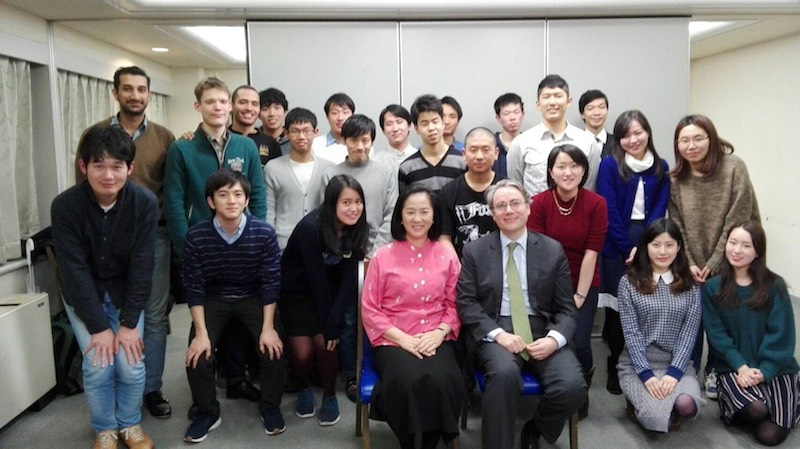- HOME
- Activities
- Forum List
- Forum Details
Feb.27.2017 KIP Forum “Recent changes in European and British Politics”
Mr.Simon King

On the evening of February 20th we had a lecture and Q&A session about some issues which Great Britain and European Union has been facing in recent times. The speaker was Mr. Simon King, former advisor of British Prime Ministers Gordon Brown and David Cameron, as well as Mrs. Theresa May. Mr. King started his career at one of the London’s auction houses because he has interest in arts. Then he worked for a long time in British government. He lives with his wife in countryside near London. Mr. King often visits Japan and owns a small business in Tokyo.
The main question we discussed with Mr. King was Brexit. Mr. King gave us a complete explanation about the reasons which brought the British society to vote for Brexit. As a matter of fact, different areas of UK voted differently. But the result itself was sensational because, as Mr. King noticed, after 20 years of stability people now want changes. Why are they so unhappy about the current situation? The answer can be found after considering two important issues: globalization and immigration.
Globalization always was a good thing for every economics in the world as it can efficiently distribute resources and attract talents. What’s wrong with it nowadays? First of all, inequality has grown dramatically: rich people become richer, poor people poorer. If you are less skilled, you lose the game, says Mr. King. Second, global companies became enormously rich and they avoid paying local taxes. Third, because of globalization many countries which were not well-developed 10-20 years ago, now become locomotives of the World’s economics. According to Mr. King, this also brings a psychological effect as people cannot feel so proud of being citizens of UK, as they did before. Additionally, they lost an alternative way of development by looking at which they could say “yes, we are doing very well”, like it was during the competition between communist and capitalist economical models before the Soviet Union disintegration.
Immigration is another issue which should be handled carefully. One of the basic principles of EU is free movement of people. But every single year around 100000 people from east Europe enter UK, and it seems to be out of control. The main problem which immigration causes is the loosing sense of identity by local people. As example, Mr. King says about some British towns where the ratio between local people and arrivals is about 50%. The problem is that people who arrive to Britain often do not want to adapt to local culture and traditions, they start introducing their culture and traditions. Recently local people has become less patient, as the problem is being very poor managed. After recent splash of immigration from Middle East countries, we saw that EU could not control it well, we can see it by looking at several acts of terrorism in European cities. All these factors proved for UK population the necessity of leaving EU. Mr. King also mentioned that US President D. Trump used the similar moods in society in his election campaign. He meant to build a wall on the US boundary with Mexico in order to decrease illegal immigration to US.
After politicians demonstrate some degree of inefficiency in the issues mentioned above, people started claiming for changes, and we can see it in very unpredictable voting results like accepting Brexit or election Mr. Trump as a President of USA. It is not easy times for politicians, Mr. King marked, as they lost trust from majority of people. Social surveys proved their inability to show the people’s real opinion. Mr. Kings links it to using old technology and inefficient structure of questions. Alternatively, social media has got a real power among people nowadays. But Mr. King emphasizes the risk of social instability if people rely on the information received from social media too much, because usually people communicate in their own circles of interest (groups), and their opinion very often cannot face the opposite argument but only support.
Among questions to Mr. King were those about identity of British people, the positions of Scotland and Northern Ireland, the inconsistency of social surveys and many others. Mr. King thinks that for Scotland it is now more difficult to leave Britain, as crude oil prices show significant drop, which means trouble for Scottish economics after becoming independent. We also touched the question of projection these problems onto Japanese society – can Japan accept more immigrants? We decided that government should control the acceptance limits in close collaboration with local communities while analyzing possible impacts of such actions.
During the discussion we proposed several measures to control immigration. Briefly, we agreed on the following mechanisms: selection criteria, adaptation or training, supporting institutions in both sides (sending and accepting).
I am very grateful to KIP and Mr. King for this evening and interesting discussion of most important European problems.
(Igor Zavialov)


